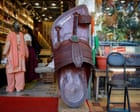
In a series of recent developments within the realms of international fashion and media, two distinct stories have captured attention worldwide, each offering a glimpse into the complex interactions of culture, society, and industry. These narratives, one involving a high-profile fashion brand and the other centered around press freedom, reveal the intricate tapestry of global challenges and dialogue.
Fashion enthusiasts and cultural advocates alike find themselves examining the decisions of Italian fashion house Prada. The brand has faced criticism for its latest design, leather sandals that closely resemble India’s traditional Kolhapuri “chappals.” These iconic handcrafted shoes, renowned for their distinctive toe-loop design, have been a part of India’s cultural heritage for centuries. Faced with allegations of cultural appropriation, Prada has openly acknowledged the origins of their inspiration. Lorenzo Bertelli, responsible for corporate social responsibility at Prada, addressed these concerns with a letter to the Maharashtra chamber of commerce. He expressed recognition of the sandals’ inspiration and emphasized respect for the traditional Indian artisans who have preserved this craft through generations.
This situation highlights ongoing conversations about cultural appreciation versus appropriation within the global fashion industry. It serves as a reminder of the importance of crediting source cultures and the artisan communities that continue to uphold these traditions. The dialogue ensures diversity is celebrated ethically and sensitively, bringing to light the balance between innovation and respect in fashion.
Meanwhile, across the globe, an urgent call for press freedom has emerged from Algeria, where journalist Christophe Gleizes faces legal challenges. The situation unfolded as Gleizes was conducting research on the Jeunesse Sportive de Kabylie football club. His interactions with a club official, who also leads an independence movement, have led to charges from the Algerian justice system. Journalistic societies worldwide have rallied for Gleizes’ release, emphasizing the fundamental principle of press freedom. These advocacy groups underscore the essential role that journalists play in shedding light on both the triumphs and tribulations of society, often putting themselves at risk for the sake of transparency and the public’s right to know.
This situation in Algeria resonates with global discussions on the freedom of the press and the vital nature of protecting those who bring critical issues to light. It brings forth conversations about the balance between national policies and international standards of media freedom. The call for Gleizes’ release reflects a broader awareness within the international community of the need to uphold democratic principles and safeguard journalistic endeavors.
Both the acknowledgement from Prada and the advocacy for Gleizes reinforce the significance of global conscientiousness in contemporary issues. These stories, although distinct, share an undercurrent of mindfulness in addressing sensitive matters with respect and open dialogue. As businesses and societies navigate cultural intersections and media landscapes, these developments urge continued reflection on the pivotal roles that accountability and freedom play in our shared global narrative.
Source: {link}
